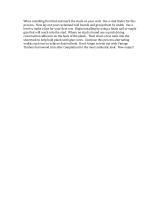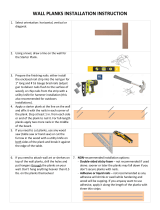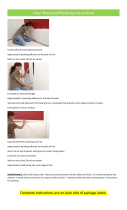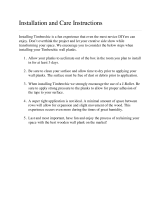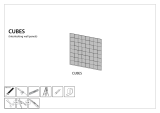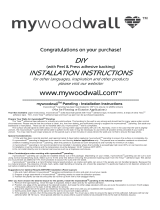Page is loading ...

• First time installers: Please consider contacting Techline for installation guidance prior to
beginning your project (1-877-276-7876).
• Open cartons 2-3 days prior to the install and allow material to adjust to the relative humidity
in the space where it will be installed. Maintain consistent humidity levels after installation.
• For the best fi nished appearance, mix planks from multiple cartons while installing.
• Ensure proper gaps are maintained around the perimeter of the room and all obstructions.
• Ensure the surface is level and planks are able to slide freely within their clips.
• This is a fl oating ceiling and planks should not be attached directly to trim, molding or walls
in a ceiling application.
• Never span more than 21-ft without an expansion joint (cover with trim).
5-in x 84-in x 3/8-in
12.7 cm x 213.36 cm x 9.525 mm
10 planks | 29 sq.ft.
IMPORTANT INFORMATION
INSTALLATION INSTRUCTIONS

Hand Saw
Saber Saw
Chalk Line
Screwdriver
Dust Mask
Circular Saw
Tape Measure
Drill /Screw Gun
Stud fi nder
Pencil
Gloves
Dust Mask
Safety Glasses
Straight Edge
4' Carpenters
Level
String/Jet Line
Screws
Glue
WOODHAVEN
PLANK
EASY UP TRACKEASY UP TRACK
CEILING CEILING
EASY UP
CLIP
DECORATIVE
TRIM
SPACER BLOCK
ATTACHED
WITH SCREW
WoodHaven
™
Ceiling Plank Installation Instructions
We are constantly working to improve our instructions with
learnings from customers like you. If you need additional
guidance, call our Techline at 1-877-ARMSTRONG (276-7876).
We recommend installing WoodHaven
™
planks using the Easy Up
®
track
and clip system. However, the clips and screws included in the box, when
used with furring strips and shims, are suitable for installations that meet
the following conditions:
• Ceiling surface is easily leveled with furring strips and shims.
• Room will not experience broad humidity and temperature differences
from season to season.
• Planks installed on non-fl at ceilings, such as vaulted or cathedral ceilings.
If you have a sloped surface (not covered in these instructions)
contact Techline at 1-877-ARMSTRONG (276-7876) for guidance.
WoodHaven Planks can also be installed on 15/16-in ceiling grid, using the
Easy Up
®
Clips in accordance with these instructions.
Space Considerations – Before You Begin
• The system is a fl oating system that allows for natural movement of a
home. Ensure that the surface is level and planks are able to slide freely
within their clips. Unlike lumber, which can twist and warp, this system
does not require nails/screws at each edge to stay fl at.
• Never span more than 21-ft without an expansion joint (cover with trim).
NOTE: do not attach the planks directly to trim, molding, or wall.
• Open cartons 2-3 days prior to the install and allow material to adjust
to the relative humidity in the space where it will be installed. Maintain
consistent temperature and humidity levels after installation. See
appropriate indoor temperature and humidity conditions for this product
in the warranty.
• For the best fi nished appearance, mix planks from multiple cartons
while installing.
• Installation must not be direct to exterior roof joist. Furring strips or
Easy Up
®
tracks will provide the required 1/2-in gap between planks
and above surface. Do not allow anything to touch the back of the
planks, such as insulation.
• Planks should not be installed below embedded radiant heat coils.
• Allow for a 1/4-in gap around all columns, beams and obstructions.
• Plan for lighting or other fi xtures that may be included in your room:
– Mount electrical boxes so they are 3/8-in lower than the surface to which
you will attach planks. (Remember to add for height of Easy Up track
(1/2-in) or furring strip. With Easy Up tracks, total drop will be 7/8-in).
– Use light fi xtures that will not raise the temperature of the planks
above 230° Fahrenheit to prevent discoloration of the plank. Contact
the lighting manufacturer for any questions about the amount of heat
generated by the light.
– Allow for a 1/4-in of space around the perimeter of the fi xture, to be
covered by the fi xture trim or facer.
• Uncertain of how these considerations impact your project—call for
guidance at 1-877-ARMSTRONG (276-7876).
Safety
• CAUTION: Wood Dust. Sawing, sanding and machining wood products
can produce dust. Airborne wood dust can cause respiratory, eye and skin
irritation. Establish and maintain adequate ventilation in the work area.
• Wear long-sleeve clothing and gloves.
• Wear safety glasses to minimize the risk of eye injury.
• Store cutting equipment properly when not in use.
• Follow manufacturer’s instructions when working with adhesives for
beaded plank installation. Armstrong does not guarantee the performance
of adhesives.
Maintenance Hints
• Wipe with a damp cloth
Tools Needed:
• For can lights/ceiling inserts: jig saw or dremel
• Crown molding >1.5-in
• Be sure to follow the manufacturer’s recommendations when using
power tools.
• For WoodHaven
™
Plank with Easy Up
®
track and clips instructions
only: Armstrong
®
Easy Up
®
tracks and clips.
• For WoodHaven Plank Clips and Screws instructions only: also add
furring strips and shims.
Installing WoodHaven
™
Planks with
Easy Up
®
tracks and clips:
LARGE CEILING REQUIREMENT
Easy Up
®
Expansion Joint
If your ceiling installation is greater than 21-ft in the length direction of the
WoodHaven
™
planks, an expansion joint is required. You will need to plan
this detail into the ceiling layout. Expansion joints can be placed more
frequently than 21-ft to achieve a balanced visual. A drawing of this detail
is shown below.
Locate where you will place your expansion joint. This joint will run parallel
to the other Easy Up
®
tracks. Mark the expansion joint location and install a
row of Easy Up track along those marks. The track should be installed end
to end. A small gap between the ends is acceptable. Next, use a WoodHaven
plank to create a spacer for the expansion joint. Rip down a WoodHaven
plank into 7/8-in wide strips. One plank should yield about 5 spacers.
Attach these strips to the face of the installed Easy Up track with screws.
Countersink the screws so they do not interfere with the next step. Leave a
1/2-in gap between the ends of these strips. The fi nal step in creating the
expansion joint will take place once the ceiling is installed. When installing
WoodHaven planks, they should be cut to leave a 1/2-in gap on either side
of the expansion joint spacer piece. After all the WoodHaven ceiling planks
are installed, fi nish off the expansion joint with a 2-1/2-in or wider piece of
decorative trim or molding (available from other manufacturers). Pre-painting
the decorative trim will help keep your ceiling installation clean. This trim
should be attached to the expansion joint assembly using fi nishing nails.
Putty and touchup paint as needed.
NOTE: Easy up track should be installed within 6-in of either side of an
expansion joint. This track will support the WoodHaven ceiling.

photo A
photo B
photo C
photo D
photo E
GENERAL INSTALLATION
In this example, we are installing
WoodHaven planks with Easy Up
track and clips over unfi nished
drywall. You can also install planks
direct to fl oor joists or studs, or other
existing ceilings, using the same
Easy Up
®
tracks.
When installing directly to an existing
ceiling, fi nd joists and mark with
chalk line. (photo A)
Running perpendicular to the joists,
mark where tracks will be placed.
Start 2-in from the starting wall.
Spacing is 24-in on center or less.
(photo B)
Ensure that you do not have tracks
running directly over light fi xture holes
or other ceiling obstructions. Adjust
tracks by reducing space between
tracks (never greater than 24-in
spacing.) (photo C)
Screw fi rst Easy Up track, making
screw connections at each joist
location. Start on your mark, 2-in from
the parallel wall, with the end of the
track against the perpendicular wall.
(photo D)
Attach second track. No need to place
end-to-end. Simply overlap tracks,
side-by-side, by at least 1-in. Leave a
1/8-in gap between tracks. (photo E)
If you need to cut track pieces shorter,
use a chop saw or hack saw. Ensure
you have the right blade for metal. Do
not crush track, as clips would not fi t.
And remember your protective safety
glasses and cut resistant gloves.
It is imperative to level your tracks.
Simply use a bubble level and insert
shims (loosen screw and tighten to
get a level track). Check both levels in
the direction of the track (parallel), as
well as across tracks (perpendicular.)
(photo F)
Continue screwing tracks to joists in
the ceiling. At the fi nishing wall, install
the last track 2-in away from the wall.
(photo G)
(In this picture, note that the installers
didn’t have to cut any metal pieces.
Overlapping the track by more than
an inch is fi ne!)
Determine Your Layout and Size of Your Border Planks. Measure
the length of the room, in the direction of your tracks, and opposite the joists,
to determine the size of your border planks.
Example: Your Room:
1. Total room length Room = 178" ____________
2. Divide total by 5" 178" ÷ 5" = 35.6 ____________
3. Multiply the remainder by 5" 0.6 x 5" = 3" ____________
4. Add 5" to the result 3" + 5" = 8" ____________
5. Divide results by 2 8" ÷ 2 = 4" ____________
6. This is your border Border plank ____________
plank width width = 4"
This is your fi rst row of planks.
Cut the “tongue” side off of the length
of the plank for your fi rst border
plank. TIP: Using a table saw or
circular saw helps to ensure a clean
straight line. (photo H)
Leaving 3/4-in from the starting wall
(closest to the end of the plank),
screw the 1st border plank in the
center of the plank right up against
your starting wall, with one screw
connecting with the track. (photo I)
Only use one screw to hold the plank
in place while you move the Easy
Up® clips into the groove edge of
the plank. Your future molding will
hold the planks in place. TIP: Another
option is to use three fi nish nails as a
ledge, located directly under the face
of the plank, on which you can rest
the plank while you slide the clips
into place.
Snap an Easy Up Clip onto every
track.(photo J)
Slide the clip on the track until it
connects with the “Groove” of the
plank. The clip should loosely hold
the upper edge of the groove on the
plank. (photo K)
Continue to build your ceiling by
connecting the tongue and groove on
the long side and end of the plank.
Ensure a 3/4-in gap* on fi nishing wall
to allow for expansion. This will be
covered by molding. (photo L)
*A 7-ft plank can expand/contract
as much as 1/4-in under extreme
humidity changes. This gap allows for
normal expansion and will be covered
by molding. Consistent humidity
levels must be maintained after
installation.
Lay out the room with staggered
seams. In most installations, you
should be able to use the leftover
cut plank from one row to start the
next row, with very little waste. Do
not use planks smaller than 26-in to
ensure attachment with two clips.
(photo M)
The tongue of the new plank will slide
into the groove of the receiving plank,
hiding the Easy Up clip.
Double check your math for the
width of the last plank. Measure the
remaining distance to the wall, and
cut off the groove edge of the plank
to fi t the space. There should be
a 3/4-in gap at the border. Tip the
tongue of the plank into the groove
of the receiving plank. (photo N)
Support the last plank by either screwing it to the Easy Up track with a
single screw (TIP: Pre-drilling helps) or create a ledge using fi nishing nails
hammered every 24-in into the wall directly below the face. (Molding will
hide screw or nails) (photo O)
We recommend fi nishing the job with crown molding (not sold by
Armstrong Ceilings), painted to match other trim in your space.
A slightly damp rag will remove any dust from your install, leaving you
with a beautiful new ceiling.
photo F
photo G
photo M
photo N
photo O
photo H
photo I
photo J
photo K
photo L
3/4" GAP

Installing WoodHaven
™
Planks Directly to Ceiling
Joists with Furring Strips and WoodHaven Clips:
LARGE CEILING REQUIREMENT
Furring Strip Expansion Joint
If your ceiling installation is greater than 21-ft in the length direction of the
WoodHaven
™
planks, an expansion joint is required. You will need to plan
this detail into the ceiling layout. Expansion joints can be placed more
frequently than 21-ft to achieve a balanced visual. A drawing of this
detail is shown below.
Locate where you will place your expansion joint. This joint will run parallel
to the other furring strips. Mark the expansion joint location and install a row
of furring strips along those marks. The furring strips should be installed
end to end with a 1/2-in gap between the ends. Next, use a WoodHaven
plank to create a spacer for the expansion joint. Rip down a WoodHaven
plank into 7/8-in wide strips. One plank should yield about 5 spacers.
Attach these strips to the face of the installed furring strip with screws.
Countersink the screws so they do not interfere with the next step. Leave a
1/2-in gap between the ends of these strips. The fi nal step in creating the
expansion joint will take place once the ceiling is installed. When installing
WoodHaven planks, they should be cut to leave a 1/2-in gap on either side
of the expansion joint spacer piece. After all the WoodHaven ceiling planks
are installed, fi nish off the expansion joint with a 2-1/2-in or wider piece of
decorative trim or molding (available from other manufacturers). Pre-painting
the decorative trim will help keep your ceiling installation clean. This trim
should be attached to the expansion joint assembly using fi nishing nails.
Putty and touchup paint as needed.
NOTE: Furring strips should be installed within 6-in of either side of an
expansion joint. These strips will support the WoodHaven ceiling.
GENERAL INSTALLATION
Locate ceiling joists if not exposed. Tap on the plaster or drywall ceiling
until you hear a solid thud, or use a stud fi nder. Generally, joists are spaced
16-in or 24-in on center. If not exposed, mark with a chalk line. Level and
attach furring strips perpendicular to the joists, starting 2-in from the fi rst
wall. Spacing should not exceed 24-in on center. If you have a sloped
surface (not covered in these instructions) contact Techline at
1-877-ARMSTRONG (276-7876) for guidance.
Determine Border Plank Size for a Balanced Appearance
Example: Your Room:
1. Measure room width same Room = 178" ____________
direction as the joists
2. Divide by 5" 178"÷ 5" = 35.6 ____________
3. Multiply the remainder by 5" 0.6 x 5" = 3" ____________
4. Add 5" to the result 3"+ 5" = 8" ____________
5. Divide result by 2 8"÷ 2 = 4" ____________
6. Record your border Border plank ____________
plank width width = 4"
Install Planks
Snap a Chalk Line
1. Measure the calculated border
plank width and snap a chalk line
at that distance from the front wall.
Cut First Border Plank
1. Familiarize yourself with the plank edges and face before you begin cutting
your fi rst plank. (illus. A)
2. Cut the fi rst row of plank to the border plank width, removing the
tongue edge. TIP: Using a table saw or circular saw helps to ensure a
clean straight line.
3. Each plank for the fi rst row will be cut to the border plank width
minus 1/2-in to allow for an expansion gap.
Install First Row of Planks
1. Align the groove edge of the border
plank with the chalk line. (illus. B)
2. Slide clips into the groove at the
furring strips and screw clips to
the underside of the furring strip.
Ensure screws are installed
straight into furring strip. If
installed at an angle, the screw
head could interfere with installation. NOTE: Plank’s groove must slide freely
with the clip. Tightening the screw too much could cause the clip to twist and
keep the planks from fl oating properly. Ensure the clips are level.
3. Continue measuring, cutting
and installing fi rst row of planks.
Cut last plank to the length
that leaves a 3/4-in gap at the
opposite side wall. (illus. C)
NOTE: 1/2-in and 3/4-in gap
are critical for normal expansion
and contraction. The gaps will be
covered by crown molding.
Instructions if Installing Item 1149 Bead Board:
Plank ends meet with a shiplap joint. When you install the second plank with
the shiplap joint facing up (illus. D) apply a small amount of water-based
wood glue to the joint. Any material expansion due to room conditions will
take place at the ends of each course of plank.
I nstall Remaining Planks
1. Seams from row to row should be
staggered. Cut some length from
the fi rst plank of the second row
to stagger the seams from row to
row keeping the 1/2-in and 3/4-in
gaps at the ends.
2. Start the second row by inserting
the tongue into the groove of the
piece in the fi rst row. (illus. E)
3. Measure the distance to the wall,
and cut the last row of planks to
fi t. Cut off the groove side. Insert
the tongue of the last row into
groove of previous row. Run 1
screw per plank into the plank at the furring strip location. OPTION: You can
drive three fi nishing nails per plank into the wall directly under the face of the
plank to hold in place. Molding will complete the installation.
FURRING STRIP
WOODHAVEN SCREW
CEILING CEILING
WOODHAVEN
CLIP
WOODHAVEN
PLANK
DECORATIVE
TRIM
SPACER BLOCK
ATTACHED
WITH SCREW
Factory
Tongue
Factory Tongue
Factory
Tongue
Factory
Groove
Surface
illus. A
Chalk Line
Furring
Strips
Second plank goes here
Side Wall
Front Wall
1st plank
illus. B
Side Wall
Side Wall
1/2" Gap
3/4" Gap
Furring Strips
illus. C
Second plank being installed
First plank in place
Glue
illus. D
Ceiling Joist
Ceiling Joist
Tongue
Groove
Furring Strips
Furring Strips
illus. E
TongueGroove

Install Molding
1. Choose molding wide enough to
cover the expansion gap and any
plank edge.
2. Paint or stain decorative molding
before installing.
3. Install molding at the joint between the ceiling and walls. Nail to the wall. Do
not nail into the WoodHaven
™
plank.
4. Nail molding into the wall studs at least every 24-in. (illus. F)
Installing WoodHaven
™
Planks on a 15/16-in
Suspension System with Easy Up
®
Clips:
LARGE CEILING REQUIREMENT
Easy Up
®
Expansion Joint
If your ceiling installation is greater than 21-ft in the length direction of
the WoodHaven
™
planks, an expansion joint is required. You will need to
plan this detail into the ceiling layout. Expansion joints can be placed more
frequently than 21-ft to achieve a balanced visual. A drawing of this
detail is shown below.
On 15/16-in grid, expansion joints should be located 6-in from a row of grid.
An additional row of 2-ft or 4-ft cross tees will need to be added 6-in on the
other side of the expansion joint to provide additional support for the WoodHav-
en planks. Depending on your grid layout and intended direction
of the planks, you may need to remove some 2-ft cross tees and add addi-
tional 4-ft cross tees to provide the required support (See detail below.) Use
a WoodHaven plank to create a spacer for the expansion joint. Rip down the
plank into 7/8-in wide and 6-ft long strips. Attach these strips to the face
of the grid and wall molding at every intersection with a screw. Countersink
the screws so they do not interfere with the installation of the fi nish molding.
NOTE: The fi nal step in creating the expansion joint will take place once the
ceiling is installed. When installing WoodHaven planks, they should be cut to
leave a 1/2-in gap on either side of the expansion joint spacer piece. Each
plank should be supported 6-in from the expansion joint with an Easy Up clip
attached to grid. After all the WoodHaven ceiling planks are installed, fi nish off
the expansion joint with a 2-1/2-in or wider piece of decorative trim or molding
(available from other manufacturers). Pre-painting the decorative trim will help
keep your ceiling installation clean. This trim should be attached to the expan-
sion joint assembly and grid using fi nishing nails or counter sunk screws. Putty
and touch up paint as needed.
GENERAL INSTALLATION:
• Do not install WoodHaven planks over an existing acoustical tile ceiling.
If you are updating an existing 15/16-in suspension system, be sure to
remove the ceiling panels prior to installing WoodHaven planks.
• If you need instructions for installing a new Armstrong
®
Prelude
®
suspension system, please visit ceilings.com/installation.
• Clips included in the WoodHaven packaging will only be utilized when a
plank’s leading edge lands on or near a parallel grid piece and an Easy Up
clip cannot be installed. See tip below.
• Easy Up
®
clips are sold separately. Visit ceilings.com to order a sample
Easy Up clip to test your grid. Clip should snap on with a snug fi t, be able
to slide on the grid, and require some force to remove.
• WoodHaven planks must be supported every 24-in.
Determine Plank Direction
• In a typical 2-ft x 4-ft suspended ceiling layout, install planks perpendicular
to the cross tees, parallel to the main beams as shown in the image below.
• In a typical 2-ft x 2-ft suspended ceiling layout, you can install planks
either perpendicular to or parallel with the cross tees as shown in the
image below.
NOTE: A 2-ft x 4-ft system can be converted to a 2-ft x 2-ft system by
adding 2-ft cross tees.
Determine Your Layout and Size of Your Border Planks. Measure
the length of the room, in the direction of your tracks, and opposite the joists,
to determine the size of your border planks.
Example: Your Room:
1. Total room length Room = 178" ____________
2. Divide total by 5" 178" ÷ 5" = 35.6 ____________
3. Multiply the remainder by 5" 0.6 x 5" = 3" ____________
4. Add 5" to the result 3" + 5" = 8" ____________
5. Divide results by 2 8" ÷ 2 = 4" ____________
6. This is your border Border plank ____________
plank width width = 4"
When starting or ending a WoodHaven Plank installation on 15/16-in
suspension system, screw the plank directly to the wall molding.
TIP: This should be covered with a molding of your choice.
Installing the First Plank
Cut the “tongue” side off of the length of the plank for your fi rst border
plank. Using a table saw or circular saw helps to ensure a clean
straight line.
Leave 3/4-in gap along the starting wall. Lift the fi rst plank up into place
and insert the Easy Up clips into the groove side of the plank. Attach the
non-supported cut edge of each plank with a screw going into the existing
wall molding. These screws should be covered with molding at the end of
the installation. Molding will add additional support for the plank.
illus. F
WOODHAVEN
PLANK
15/16" GRID
EASY UP
CLIP
CROSS TEE CROSS TEE
DECORATIVE
TRIM
SPACER BLOCK
ATTACHED WITH SCREW
6" 6"
EASY UP
CLIP
2' x 2' GRID 2' x 2' GRID
REMOVE 2' CROSS TEES ADD ADDITIONAL
4' CROSS TEES
EXPANSION
JOINT
PLANK DIRECTION
WOODHAVEN
™
PLANK
2' x 4' GRID
(NOT TO SCALE)
MAIN BEAMS
2' x 2' GRID
WOODHAVEN
™
PLANK
WOODHAVEN
™
PLANK
(NOT TO SCALE)

TIP: Another option is to use three fi nishing nails as a ledge, located
directly under the face of the plank, on which you can rest the plank while
you slide the clips into place.
Installing the Remaining Planks
Lay out the room with staggered seams. In most installations, you should
be able to use the leftover cut plank from one row to start the next row,
with very little waste. Do not use planks smaller than 26-in to ensure
attachment with two clips.
Continue installing the plank by connecting the tongue and groove on the
long side and end of the plank and snapping an Easy Up Clip at every grid
intersection. Slide the clip on the grid until it connects with the “Groove”
of the plank. The clip should loosely hold the upper edge of the groove
on the plank.
TIP: If a plank’s leading edge lands on or near a parallel grid piece, the
Easy Up clips may not be able to be properly installed. Use the WoodHaven
clip provided in the plank packaging and screw the clip directly to the grid.
Continue to build your ceiling. Double check your math for the width of the
last plank. Measure the remaining distance to the wall, and cut off the
groove edge of the plank to fi t the space. Ensure a 3/4-in gap* on fi nishing
wall to allow for expansion.
To install the last plank tip the tongue of the plank into the groove of the
receiving plank. Support this plank by either screwing it to the wall molding
with a single screw or create a ledge using fi nishing nails hammered every
24-in into the wall directly below the face.
TIP: Pre-drilling helps.
We recommend fi nishing the job with crown molding (not sold by Armstrong
Ceilings), painted to match other trim in your space. Clean with a slightly
damp rag to remove any dust from your install, leaving you with a beautiful
new ceiling.
*A 7-ft plank can expand/contract as much as 1/4-in under extreme humidity
changes. This gap allows for normal expansion and will be covered by molding.
Consistent humidity levels must be maintained after installation.
Installing WoodHaven
™
Planks on Walls
• Certain WoodHaven
™
Plank fi nishes can be used as wainscoting or on
a wall. Visit ceilings.com/woodhaven to view available options.
• Open cartons 2-3 days prior to the install and allow material to adjust
to the relative humidity in the space where it will be installed. Maintain
consistent humidity levels after installation.
• Vertical layouts cannot exceed 84-in (length of one plank.) No joints
allowed in this direction.
• Backer material is recommended for vertical installations to smooth
out the wall.
• Backer material or furring strips are required for horizontal installations.
Tools Needed:
Hand saw, circular saw (optional), saber saw (optional), measuring tape,
chalk line, cordless or hand screwdriver and pencil. When using power
tools, be sure to follow the manufacturer’s recommendations for their use.
To prevent wet fl oors from damaging the planks, install a piece of 3/8-in
thick spacer material on the wall at the fl oor so the bottom of the planks
can butt against the top of the spacer material.
While the traditional orientation of wainscoting is vertical, the WoodHaven
™
planks can be installed on walls either vertically or horizontally.
Installing WoodHaven Planks Vertically on a Wall
When installing the planks vertically,
you should use a construction
adhesive to secure the planks to the
wall or backer material. Be sure to
check that the adhesive is suitable
for the surface you are adhering to.
Follow the adhesive manufacturer’s
recommendations for surface
preparation and application rate. If
the planks do not stick to the wall
immediately, use painter’s tape to
hold the planks to the wall until the
adhesive sets up. (illus. G) Finish
with a trim of your choice.
Installing WoodHaven Planks Horizontally on a Wall
For horizontal installations, fi rst
install your backer material or
furring strips (space furring strips
no further than 24-in apart.) Install
your spacer material at the bottom
of the wall. When installing
horizontally, you will use the
WoodHaven clips enclosed in the
WoodHaven carton. With the long
tongue edge of the fi rst plank
resting on the spacer material,
you place the clip over the fl ange
and attach to the backer material or furring strip. Fasten with clips every
24-in. (illus. H)
Finish with a baseboard of your choice covering the spacer material and the
bottom of the planks. Trim can be installed at the top of the plank to serve
as a chair rail or to fi nish the installation.
Maintenance Recommendation:
Clean with a damp cloth.
WoodHaven
™
Ceiling Plank Ten (10) Year
Limited Warranty
For the most up-to-date warranty information, visit
ceilings.com/warranty.
For additional information on installing WoodHaven
™
Planks,
including special installation tips and videos, please visit our
website at ceilings.com or call customer service at
1-877-ARMSTRONG (276-7876).
Tell us what you think!
Thank you for your purchase. We hope you’re happy with your
Armstrong
®
product and want to hear from you.
Please visit ceilings.com/review to write a review.
ADHESIVE
1 1/2" SPACER MATERIAL
illus. G
CLIP
FURRING
STRIP
illus. H
LA-295529-WEB-619
/
